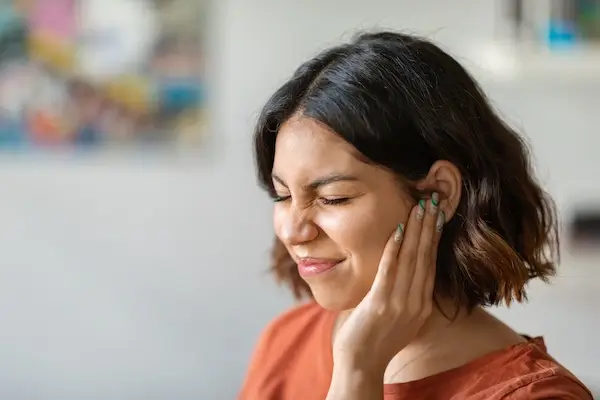Should I Wear A Nightguard?
 A nightguard is an oral device worn while sleeping to protect your teeth and jaw from clenching and grinding. Over time clenching and grinding can cause unnecessary wear on the teeth, sometimes leading to chips, cracks, and even tooth loss.
A nightguard is an oral device worn while sleeping to protect your teeth and jaw from clenching and grinding. Over time clenching and grinding can cause unnecessary wear on the teeth, sometimes leading to chips, cracks, and even tooth loss.
Night mouthguards are soft plastic and fit comfortably over your teeth. The nightguard absorbs force and friction from tooth grinding that can wear down the enamel and damage your teeth over time.
However, nightguards are not just for individuals who grind their teeth. Various conditions can benefit from wearing a nightguard. To see if a nightguard is right for you, call our sleep apnea specialist, Dr. Brian McDowell, for an evaluation and custom fitted oral appliance.
Snoring & Sleep Apnea
Nightly snoring is often a sign of obstructive sleep apnea (OSA), a medical condition in which breathing stops for short periods when sleeping, often up to 10 seconds. Short periods of stopped breathing during sleep can prevent your body from receiving adequate oxygen, which increases your risk of health issues like heart disease and stroke.
A nightguard for snoring and sleep apnea differs slightly from a custom mouthguard. Our highly trained dentist in Fitchburg, Dr. McDowell, designs each oral appliance for sleep apnea to keep the airway open by gently pushing the lower jaw and tongue forward. This gentle pushing helps prevent the soft tissue and tongue in the back of the throat from collapsing and blocking the airway.
Grinding Teeth At Night
Bruxism is the habitual grinding or clenching of teeth, which can cause wear and cause chips, cracks, or other damage. Bruxism may also lead to headaches, jaw pain, and tooth sensitivity. The cause of bruxism is unknown, but it may be correlated to anxiety, stress, or sleep disorders.
A nightguard protects your teeth from the wear and damage caused by grinding (bruxism) by absorbing the force and lessening tension and pain in the jaw muscles.
TMJ ~ Temporomandibular Joint Disorder
TMJ is a severe condition that affects an individual’s temporomandibular joint, which connects the lower jawbone to the skull. It can cause jaw, neck, and shoulder pain, making it difficult to open or close your mouth. TMJ affects between 5% and 12% of individuals. Fortunately, TMJ is very treatable, and a nightguard is an effective non-invasive way to manage the medical condition. A nightguard can relieve some of the symptoms of TMJ because it keeps the jaw relaxed, alleviating pain and reducing inflammation.
Protects Dental Veneers & Restorations
Veneers and other dental restorations are dental treatments used to improve the function and appearance of teeth and provide added strength and aesthetics. Veneers are thin porcelain shells that your cosmetic dentist cements to the front of your teeth. Restorations, like fillings and crowns, replace tooth structures lost due to tooth decay or damage.
Nightguards are recommended for people with dental veneers or other dental restorations, as these teeth are more susceptible to damage. A nightguard keeps the teeth in alignment, preventing them from grinding and causing chips or cracks. This protection can prolong the restoration’s lifespan.
Improve Sleep Quality At Brian C. McDowell, DDS
Visit Brian C. McDowell, DDS, for custom-made oral appliances to protect your teeth and improve your quality of sleep. Call us at 978-252-2049 to book an appointment and learn how an oral appliance can get you a better night of sleep!
 Temporomandibular Joint Disorder (TMJ) can have a profound impact on your daily life. From eating difficulties to sleep disturbances, TMJ can affect various aspects of your well-being. Understanding the impact of TMJ on daily life and how to cope with them is crucial for managing the condition effectively. If you experience any of the symptoms below, schedule a consultation with Dr. Brian McDowell at his Fitchburg dental practice.
Temporomandibular Joint Disorder (TMJ) can have a profound impact on your daily life. From eating difficulties to sleep disturbances, TMJ can affect various aspects of your well-being. Understanding the impact of TMJ on daily life and how to cope with them is crucial for managing the condition effectively. If you experience any of the symptoms below, schedule a consultation with Dr. Brian McDowell at his Fitchburg dental practice.

 Are you struggling to get enough sleep? Do you wake up tossing and turning? Are you frequently tired during the day? Or are your loved ones complaining about snoring? If so, you may be suffering from sleep apnea.
Are you struggling to get enough sleep? Do you wake up tossing and turning? Are you frequently tired during the day? Or are your loved ones complaining about snoring? If so, you may be suffering from sleep apnea. A nightguard is an oral device worn while sleeping to protect your teeth and jaw from clenching and grinding. Over time clenching and grinding can cause unnecessary wear on the teeth, sometimes leading to chips, cracks, and even tooth loss.
A nightguard is an oral device worn while sleeping to protect your teeth and jaw from clenching and grinding. Over time clenching and grinding can cause unnecessary wear on the teeth, sometimes leading to chips, cracks, and even tooth loss.